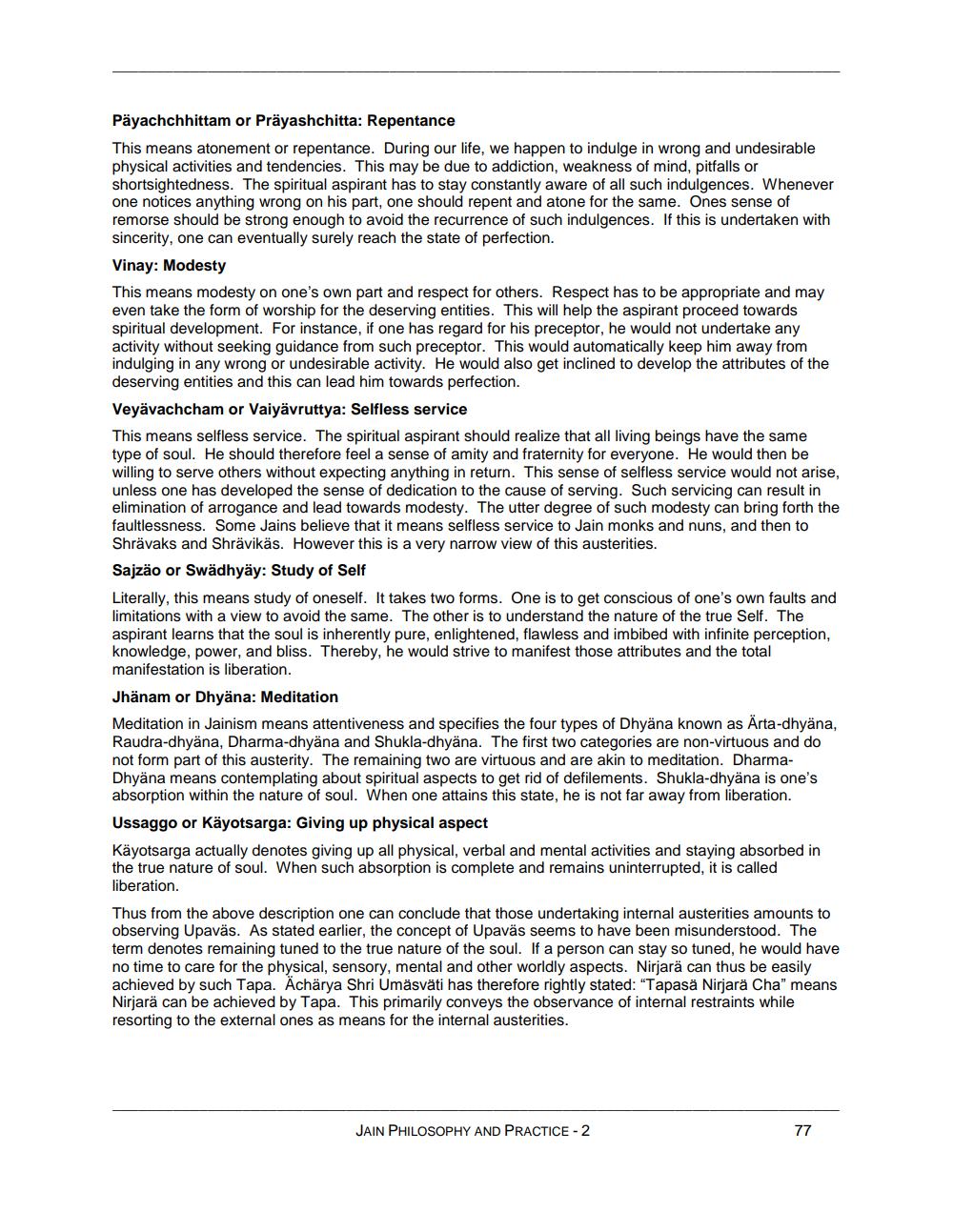________________
Päyachchhittam or Präyashchitta: Repentance
This means atonement or repentance. During our life, we happen to indulge in wrong and undesirable physical activities and tendencies. This may be due to addiction, weakness of mind, pitfalls or shortsightedness. The spiritual aspirant has to stay constantly aware of all such indulgences. Whenever one notices anything wrong on his part, one should repent and atone for the same. Ones sense of remorse should be strong enough to avoid the recurrence of such indulgences. If this is undertaken with sincerity, one can eventually surely reach the state of perfection.
Vinay: Modesty
This means modesty on one's own part and respect for others. Respect has to be appropriate and may even take the form of worship for the deserving entities. This will help the aspirant proceed towards spiritual development. For instance, if one has regard for his preceptor, he would not undertake any activity without seeking guidance from such preceptor. This would automatically keep him away from indulging in any wrong or undesirable activity. He would also get inclined to develop the attributes of the deserving entities and this can lead him towards perfection.
Veyävachcham or Vaiyävruttya: Selfless service
This means selfless service. The spiritual aspirant should realize that all living beings have the same type of soul. He should therefore feel a sense of amity and fraternity for everyone. He would then be willing to serve others without expecting anything in return. This sense of selfless service would not arise, unless one has developed the sense of dedication to the cause of serving. Such servicing can result in elimination of arrogance and lead towards modesty. The utter degree of such modesty can bring forth the faultlessness. Some Jains believe that it means selfless service to Jain monks and nuns, and then to Shrävaks and Shrävikäs. However this is a very narrow view of this austerities.
Sajzäo or Swädhyäy: Study of Self
Literally, this means study of oneself. It takes two forms. One is to get conscious of one's own faults and limitations with a view to avoid the same. The other is to understand the nature of the true Self. The aspirant learns that the soul is inherently pure, enlightened, flawless and imbibed with infinite perception, knowledge, power, and bliss. Thereby, he would strive to manifest those attributes and the total manifestation is liberation.
Jhänam or Dhyäna: Meditation
Meditation in Jainism means attentiveness and specifies the four types of Dhyäna known as Ärta-dhyäna, Raudra-dhyäna, Dharma-dhyäna and Shukla-dhyäna. The first two categories are non-virtuous and do not form part of this austerity. The remaining two are virtuous and are akin to meditation. DharmaDhyäna means contemplating about spiritual aspects to get rid of defilements. Shukla-dhyäna is one's absorption within the nature of soul. When one attains this state, he is not far away from liberation.
Ussaggo or Käyotsarga: Giving up physical aspect
Käyotsarga actually denotes giving up all physical, verbal and mental activities and staying absorbed in the true nature of soul. When such absorption is complete and remains uninterrupted, it is called liberation.
Thus from the above description one can conclude that those undertaking internal austerities amounts to observing Upaväs. As stated earlier, the concept of Upaväs seems to have been misunderstood. The term denotes remaining tuned to the true nature of the soul. If a person can stay so tuned, he would have no time to care for the physical, sensory, mental and other worldly aspects. Nirjarä can thus be easily achieved by such Tapa. Ächärya Shri Umäsväti has therefore rightly stated: "Tapasä Nirjarä Cha" means Nirjarä can be achieved by Tapa. This primarily conveys the observance of internal restraints while resorting to the external ones as means for the internal austerities.
JAIN PHILOSOPHY AND PRACTICE - 2
77




